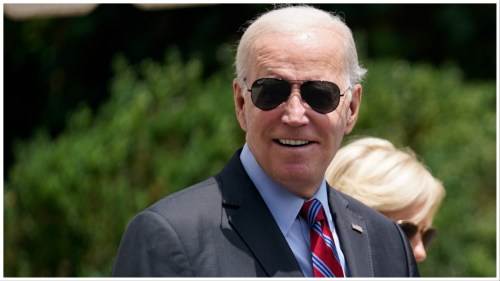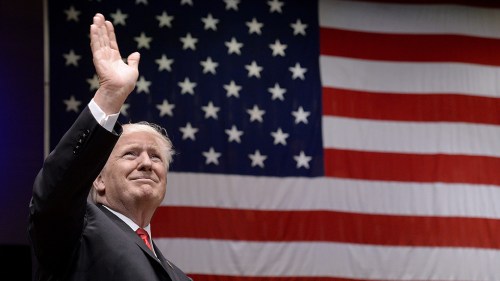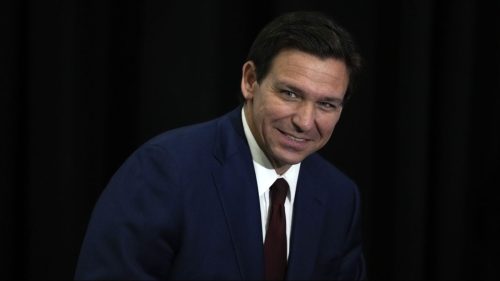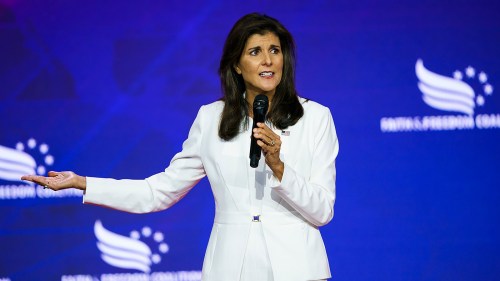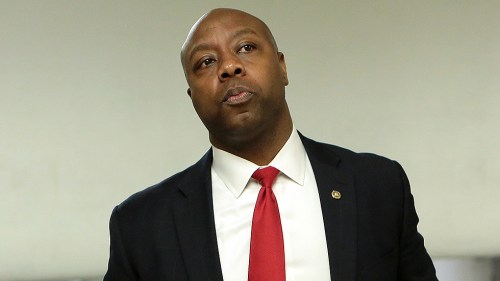Trump’s rivals face growing pressure to cut into his lead
Former President Trump’s rivals are under growing pressure to close the gap with him as his grip on the party shows no signs of weakening.
Trump has remained the clear front-runner for the Republican nomination through months of campaigning, four indictments in multiple jurisdictions and skipping the first GOP debate last month, and polls have mostly shown a shift in other candidates’ positioning rather than fluctuations in Trump’s numbers.
The election cycle is still in its early stages with several months before the first votes, but strategists say the other candidates must explain why they are a better choice than Trump if they want to beat him.
“He’s not really being challenged,” GOP strategist Chip Felkel said. “He’s not being challenged by anyone at all other than [former New Jersey Gov. Chris] Christie, who isn’t going anywhere, and [former Arkansas Gov. Asa] Hutchinson. The people who could actually make a dent are too scared of his voters to actually go after the orange elephant in the room.”
Trump’s 2024 candidacy is unlike any other in U.S. history. He’s the first former president to run for the White House since Herbert Hoover in 1940 and the first to be indicted, facing four cases in multiple jurisdictions while running for the country’s highest office.
But he has remained the clear favorite to win the Republican nomination, leading by 30 points or more over his next closest opponent in the race in national and state polls.
Strategists say that’s in part because the nearly a dozen Republican candidates have been so hesitant to separate themselves from the former president over fears of being attacked and having that sinking their candidacies.
Felkel said the situation may be different if the candidates change course and run more directly against Trump, but the “numbers aren’t going to change” if not. He said a campaign with the “baggage” of Trump’s would have already been ended if the candidate was anyone other than Trump.
“When I started working in politics, if there’s a rumor that a guy smoked weed in college or cheated on his wife, his campaign would have been over,” he said.
Trump’s lead in the RealClearPolitics polling average is as large now as it has been throughout the 2024 election cycle. His lead over his next closest opponent, Florida Gov. Ron DeSantis, expanded since the first Republican debate last month from just above 30 points to more than 40 points.
Felkel added that the other candidates likely hoped the legal system would “do the work for them” in taking Trump out of the race, but that has not come to fruition so far.
Trump has been indicted four times — in Manhattan for the Stormy Daniels hush money case; in Florida for the classified and sensitive documents case; and in Washington, D.C., and Fulton County, Ga., for cases on efforts to overturn the 2020 presidential election.
But his significant lead has stayed, and if anything has increased, following multiple indictments being filed against him. Trump saw the most notable increase in his numbers after his first indictment in Manhattan in the spring.
Further demonstrating the extent of his lead, Trump skipped the first debate despite easily qualifying for it and has not shown signs that he plans to participate in the upcoming ones. A few candidates, like former United Nations Ambassador Nikki Haley and former Vice President Mike Pence, received praise for their performances, but none has made significant inroads in the primary.
Republican strategist Jimmy Centers said future debates, including the one scheduled for later this month at the Ronald Reagan Presidential Library in California, could be an opportunity for the other candidates to improve their standing if they change their approach.
“Given how big former President Trump’s lead is, in my opinion, you need to start demonstrating why it’s critical for Republicans to change course,” he said. “Because thus far, just sharing the message and who you are and what you’re going to do is not working.”
Several candidates are striving to cut into Trump’s lead in Iowa, which will be the first state to vote in the nominating process.
Centers, who is based in Iowa, said the nominating process will be “pretty well over” if Trump wins the Iowa caucuses and in New Hampshire, the second state to vote. He said three “tickets” are usually booked for candidates out of Iowa, but he expects there might only be two candidates with potentially viable candidacies after Iowa this year.
He added that whoever comes in second in the state must defeat the candidate in third by more than only a few points to be able to argue they can be an alternative to him.
“It’s going to be incredibly difficult for a potentially alternative candidate to the former president to make that case that they are the alternative if they don’t win second in Iowa by a large margin,” Centers said.
He said candidates need to “start making moves” in Iowa, and the polls need to show at least some tightening for another candidate to have a chance in the state.
GOP strategist Saul Anuzis pointed to a behind-the-scenes fight taking place on the distribution of delegates in the primaries and caucuses as key to determining whether someone other than Trump could have a chance at the nomination.
State parties set delegate allocation rules and have various methods for awarding delegates based on how a candidate performs. Some states use a winner-take-all system, while others award delegates proportionally or based on congressional district or reaching a certain threshold.
Anuzis said Trump wants as many states to use winner-take-all as possible, while the other candidates want a proportional system to give themselves more opportunities. He said the rules need to all be set by the end of the month, so that will paint a clearer picture of other candidates’ prospects.
“Whenever we know what the results are of all 50 states filing, we’ll have a pretty good idea of what chance people have … to either win the nomination or challenge Trump for the nomination,” he said.
Anuzis said candidates won’t win the nomination by attacking Trump but rather by explaining why they are a better choice, pointing to their ability to serve two terms while Trump can only serve one more and that other candidates are less controversial.
“If you’ve been attacking Trump, the odds are those voters don’t go to you,” he said, referring to Trump’s supporters. “You’ve got to handle it in a way that allows you to appeal to arguably an overwhelming plurality or majority of Republican activists who are currently Trump supporters.”
Strategists also said the potential obstacles to Trump’s nomination will likely only help him be the nominee.
Anuzis said the cases against Trump have energized his base of voters and improved his standing to win the nomination.
“I think these political prosecutions of various cases have actually backfired on the Democrats and have worked to strengthen his position and to deepen the level of support amongst his supporters,” he said.
Arizona-based GOP strategist Barrett Marson said the efforts to disqualify Trump from the ballot through the Constitution’s 14th Amendment over his ties to the Jan. 6, 2021, Capitol riot is a “misguided attempt” that could yield sympathy to the former president.
Lawsuits have been filed in Colorado and Minnesota to block Trump from the ballot based on an argument that he “engaged in insurrection,” as the 14th Amendment states, and therefore cannot hold public office.
Marson said these attempts will only further “prop up” Trump and “offend even Never Trumpers,” right-leaning independents and moderate Republicans.
“It would elicit sympathy for a completely unsympathetic figure,” he said. “It would completely go against what these people are trying to do.”
Copyright 2023 Nexstar Media Inc. All rights reserved. This material may not be published, broadcast, rewritten, or redistributed. Regular the hill posts
